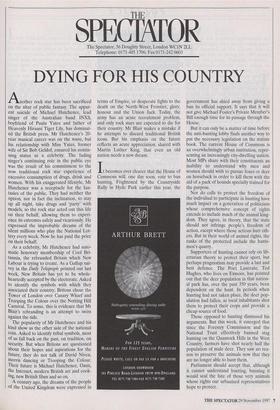SPECTATOR
The Spectator, 56 Doughty Street, London WC1N 2LL Telephone: 0171-405 1706; Fax 0171-242 0603
DYING FOR HIS COUNTRY
Art other rock star has been sacrificed on the altar of public fantasy. The appar- ent suicide of Michael Hutchence, lead singer of the Australian band INXS, boyfriend of Paula Yates and father of Heavenly Hiraani Tiger Lily, has dominat- ed the British press. Mr Hutchence's 20- year musical career was on the wane, but his relationship with Miss Yates, former wife of Sir Bob Geldof, ensured his contin- uing status as a celebrity. The fading singer's continuing role in the public eye was the result of his commitment to the now traditional rock star experience of excessive consumption of drugs, drink and women. With his exaggerated lifestyle, Mr Hutchence was a receptacle for the fan- tasies of the public. They had neither the option, nor in fact the inclination, to stay up all night, take drugs and 'party' with models, so the rock star acted out this life on their behalf, allowing them to experi- ence its extremes safely and vicariously. He expressed the improbable dreams of the silent millions who play the National Lot- tery every week. Now he has paid the price on their behalf.
As a celebrity, Mr Hutchence had auto- matic honorary membership of Cool Bri- tannia, the rebranded Britain which New Labour is trying to create. As a Gallup sur- vey in the Daily Telegraph pointed out last week, New Britain has yet to be whole- heartedly accepted by the electorate. Asked to identify the symbols with which they associated their country, Britons chose the Tower of London over Canary Wharf and Trooping the Colour over the Notting Hill Carnival. To some, this is evidence that Mr Blair's rebranding is an attempt to swim against the tide.
The popularity of Mr Hutchence and his kind show us the other side of the national coin. Asked to identify tribal symbols, most of us fall back on the past, on tradition, on security. But when Britons are questioned about their hopes and aspirations for the future, they do not talk of David Niven, morris dancing or Trooping the Colour. Their future is Michael Hutchence, Oasis, the Internet, modern British art and cook- log, new British films and so on.
A century ago, the dreams of the people of the United Kingdom were expressed in terms of Empire, or desperate fights to the death on the North-West Frontier, glory, honour and the Union Jack. Today, the army has an acute recruitment problem, and only rock stars are expected to die for their country. Mr Blair makes a mistake if he attempts to discard traditional British icons. But his emphasis on the future reflects an acute appreciation, shared with Martin Luther King, that even an old nation needs a new dream.
t becomes ever clearer that the House of Commons will, one day soon, vote to ban hunting. Frightened by the Countryside Rally in Hyde Park earlier this year, the
I
government has shied away from giving a ban its official support. It says that it will not give Michael Foster's Private Member's Bill enough time for its passage through the House.
But it can only be a matter of time before the anti-hunting lobby finds another way to put the necessary legislation on the statute book. The current House of Commons is an overwhelmingly urban institution, repre- senting an increasingly city-dwelling nation. Most MPs share with their constituents an inability to understand why men and women should wish to pursue foxes or deer on horseback in order to kill them with the aid of a pack of hounds specially trained for the purpose.
Nor do calls to protect the freedom of the individual to participate in hunting have much impact on a generation of politicians whose comprehensive concept of rights extends to include much of the animal king- dom. They agree, in theory, that the state should not infringe people's freedom of action, except where those actions hurt oth- ers. But in their world of animal rights, the ranks of the protected include the hunts- men's quarry.
Supporters of hunting cannot rely on lib- ertarian theory to protect their sport, but perhaps pragmatism may provide a last and best defence. The Poet Laureate, Ted Hughes, who lives on Exmoor, has pointed out that the deer population in that nation- al park has, over the past 350 years, been dependent on the hunt. In periods when hunting had not taken place, the deer pop- ulation had fallen, as local inhabitants shot them to protect their crops and provide a cheap source of food.
Those opposed to hunting dismissed his arguments. But this week, it emerged that since the Forestry Commission and the National Trust effectively banned stag hunting on the Quantock Hills in the West Country, farmers have shot nearly half the population of male deer. They saw no rea- son to preserve the animals now that they are no longer able to hunt them.
Parliament should accept that, although it cannot understand hunting, banning it would seal the fate of those very animals whose rights our urbanised representatives hope to protect.


















































































 Previous page
Previous page